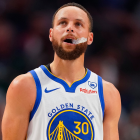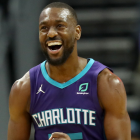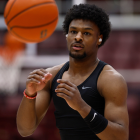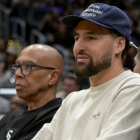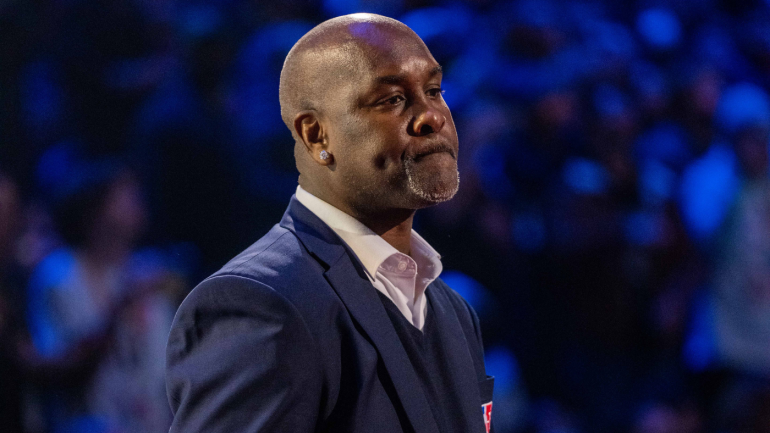
Hall of Famer and NBA 75th Anniversary Team selectee Gary Payton's legacy has noticeably been carried on during the NBA Finals by his son, Golden State Warriors defensive menace Gary Payton II. That legacy began with the elder Payton's late father, Al, a Bay Area legend known as "Mr. Mean" due to his no-nonsense approach to just about every facet of life. He helped train Gary Sr. on the court, while keeping him from succumbing to the temptations and dangers of Oakland in the early 1980s.
As important as basketball is to the Paytons, however, Al also instilled a necessary fiber of their being: Giving back to the community.
"My dad was my hero. My dad was the one who was in the community when my best friends, a lot of my guys, didn't have a father," Gary Payton Sr. told CBS Sports in a video interview. "They just had a mother who was working, and they could get out on the streets and do bad things. But my dad was there to help them in that community -- get them tennis shoes, get them a place to play basketball, get them a place to go do things. That's what I've seen, and I decided I needed to help once I made it in my life."
Throughout his 17-year NBA career and post-retirement, Payton has consistently given his time, money and energy to his hometown Oakland community, along with various other national and international charities. Whether setting up a youth center or providing children with shopping sprees for the holidays, Payton has always found time to do the work that he feels is necessary.
So when the COVID-19 pandemic hit, devastating countless businesses across the country that struggled to keep employees and customers, Payton sprung into action. He partnered with Hennessy in a program called Unfinished Business, a long-term initiative that has distributed more than $7.5 million to help Black, Latinx and Asian-American-owned small businesses get through the challenges brought on by the pandemic.
"We just decided that we needed to get these people back on their feet, and that's what we tried to do," Payton told CBS Sports. "When you put up your life savings -- your life savings -- to start something, and it gets taken away like that just on an unfortunate thing, it's not fair. If we have the ability to come and help, we're gonna do that."
The initiative has enlisted 17 NBA teams to contribute so far, and their biggest impact is yet to come. In honor of the 75th Anniversary of the NBA, Hennessy is spotlighting 75 Unfinished Business recipients that are going above and beyond to make an impact in their communities. Information about the businesses can be found on the Instagram accounts of Payton (@Gary.Payton.20) and Hennessy (@HennessyUS). So far, the response from business owners they've helped has been overwhelming.
"You've got people who are just saying (Payton sighs) 'thank you.' You know what I'm saying?" Payton told CBS Sports. Giving it back to them, that's what we want to keep doing. We want to just keep helping."

CBS Sports HQ Newsletter
Your Ultimate Guide to Every Day in Sports
We bring sports news that matters to your inbox, to help you stay informed and get a winning edge.
Thanks for signing up!
Keep an eye on your inbox.
Sorry!
There was an error processing your subscription.
While Gary Payton II, a breakout player for the Warriors this season, may have inherited his defensive chops from his father, he also inherited a willingness, or necessity, for charity. Payton II was honored with the NBA's 2021-22 Bob Lanier Community Assist Award due to his community outreach in support of the Bay Area Youth. He's been open about his personal struggle with dyslexia and launched the GPII foundation earlier this season in order to raise dyslexia awareness. He also hosted his first-ever Reading Rally with Decoding Dyslexia for students affected by learning disabilities and invited members of the program to his ticket section at Warriors home games.
The name of his ticket section at Chase Center? "Mr. Mean's Team," in honor of his grandfather.
"He looked at me and seen what I was doing, and now he's doing it on a bigger stage," Payton Sr. said of his son. "So I just appreciate all of that."
The story of the Paytons reinforces the contagious nature of giving. What started with Al was engrained in Gary Sr., who passed it on to Gary II. As a result, they've touched countless lives -- maybe even saved some -- using basketball as a means to improve their communities, and the world at large.
"I feel God put me on earth to play basketball. ... Now what he did is, after 15 years of retirement, he still made me relevant in this world, and what relevant means is that I can get on this platform and help the people that I need to help," Payton Sr. told CBS Sports. "And that's what I'm doing. I'm just helping people more and more and more."










